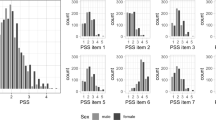Abstract
The aim of this study was to evaluate the associations between psychological resilience and epigenetic clocks assessed by DNA methylation age predictions. We used data from 4018 participants in the Health and Retirement Study. Multivariable linear regression models were used to estimate the association between psychological resilience and epigenetic clocks adjusted for age, sex, race, body mass index, smoking status, and years of education. Thirteen epigenetic clocks were used in our analysis and were highly correlated with one another. A higher psychological resilience score was associated with slower DNA methylation age acceleration for the majority of epigenetic clocks after multivariable adjustment. These findings imply that people with a higher level of psychological resilience may experience slower DNA methylation age acceleration and biological aging.

Similar content being viewed by others
Data availability
The data are publicly available.
References
Crimmins EM, Thyagarajan B, Levine ME, et al. Associations of age, sex, race/ethnicity, and education with 13 epigenetic clocks in a nationally representative U.S. sample: the health and retirement study. J Gerontol A Biol Sci Med Sci. 2021;76(6):1117–23. https://doi.org/10.1093/gerona/glab016.
Mehta D, Bruenig D, Lawford B, et al. Accelerated DNA methylation aging and increased resilience in veterans: the biological cost for soldiering on. Neurobiol Stress. 2018;8:112–9. https://doi.org/10.1016/j.ynstr.2018.04.001.
Horvath S, Gurven M, Levine ME, et al. An epigenetic clock analysis of race/ethnicity, sex, and coronary heart disease. Genome Biol. 2016;17(1):171. https://doi.org/10.1186/s13059-016-1030-0.
Schmitz LL, Zhao W, Ratliff SM, et al. The socioeconomic gradient in epigenetic ageing clocks: evidence from the multi-ethnic study of atherosclerosis and the health and retirement study. Epigenet. 2022;17(6):589–611. https://doi.org/10.1080/15592294.2021.1939479.
Levine ME, Lu AT, Quach A, et al. An epigenetic biomarker of aging for lifespan and healthspan. Aging (Albany NY), 2018;10(4): 573-591. https://doi.org/10.18632/aging.101414.
Harvanek ZM, Fogelman N, Xu K, et al. Psychological and biological resilience modulates the effects of stress on epigenetic aging. Transl Psychiatry. 2021;11(1):601. https://doi.org/10.1038/s41398-021-01735-7.
Galkin F, Kochetov K, Koldasbayeva D, et al. Psychological factors substantially contribute to biological aging: evidence from the aging rate in Chinese older adults. Aging (Albany NY). 2022;14(18):7206-7222. https://doi.org/10.18632/aging.204264.
Boks MP, Van Mierlo HC, Rutten BP, et al. Longitudinal changes of telomere length and epigenetic age related to traumatic stress and post-traumatic stress disorder. Psychoneuroendocrin. 2015;51:506–12. https://doi.org/10.1016/j.psyneuen.2014.07.011.
Mutz J, Roscoe CJ, Lewis CM. Exploring health in the UK Biobank: associations with sociodemographic characteristics, psychosocial factors, lifestyle and environmental exposures. BMC Med. 2021;19(1):240. https://doi.org/10.1186/s12916-021-02097-z.
Wurm S, Warner LM, Ziegelmann JP, et al. How do negative self-perceptions of aging become a self-fulfilling prophecy? Psychol Aging. 2013;28(4):1088–97. https://doi.org/10.1037/a0032845.
Fontes AP, Neri AL. Resilience in aging: literature review. Cien Saude Colet. 2015;20(5):1475–95. https://doi.org/10.1590/1413-81232015205.00502014.
Lavretsky H. Health, resilience, and successful aging in the older US veterans. Am J Geriatr Psychiat. 2021;29(3):257–9. https://doi.org/10.1016/j.jagp.2020.08.018.
Merchant RA, Aprahamian I, Woo J, et al. Editorial: resilience and successful aging. J Nutr Health Aging. 2022;26(7):652–6. https://doi.org/10.1007/s12603-022-1818-4.
Ukraintseva S, Arbeev K, Duan M, et al. Decline in biological resilience as key manifestation of aging: potential mechanisms and role in health and longevity. Mech Ageing Dev. 2021;194:111418. https://doi.org/10.1016/j.mad.2020.111418.
Baskin RG, Bartlett R. Healthcare worker resilience during the COVID-19 pandemic: an integrative review. J Nurs Manag. 2021;29(8):2329–42. https://doi.org/10.1111/jonm.13395.
Palma-Gudiel H, Fananas L, Horvath S, et al. Psychosocial stress and epigenetic aging. Int Rev Neurobiol. 2020;150:107–28. https://doi.org/10.1016/bs.irn.2019.10.020.
Sumner JA, Colich NL, Uddin M, et al. Early experiences of threat, but not deprivation, are associated with accelerated biological aging in children and adolescents. Biol Psychiatry. 2019;85(3):268–78. https://doi.org/10.1016/j.biopsych.2018.09.008.
Sonnega A, Faul JD, Ofstedal MB, et al. Cohort Profile: the Health and Retirement Study (HRS). Int J Epidemiol. 2014;43(2):576–85. https://doi.org/10.1093/ije/dyu067.
EILEEN. CRIMMINS J K K J F, JESSICA FAUL. HRS epigenetic clocks – release 1. Ann Arbor Michigan: Survey Research Center, Institute for Social Research; 2020.
Manning LK, Carr DC, Kail BL. Do higher levels of resilience buffer the deleterious impact of chronic illness on disability in later life? Gerontol. 2016;56(3):514–24. https://doi.org/10.1093/geront/gnu068.
Wagnild GM, Young HM. Development and psychometric evaluation of the Resilience Scale. J Nurs Meas. 1993;1(2):165–78.
Zeng Y, Shen K. Resilience significantly contributes to exceptional longevity. Curr Gerontol Geriatr Res. 2010;2010:525693. https://doi.org/10.1155/2010/525693.
Horvath S, Raj K. DNA methylation-based biomarkers and the epigenetic clock theory of ageing. Nat Rev Genet. 2018;19(6):371–84. https://doi.org/10.1038/s41576-018-0004-3.
Yusupov N, Dieckmann L, Erhart M, et al. Transdiagnostic evaluation of epigenetic age acceleration and burden of psychiatric disorders. Neuropsychopharmacol. 2023; https://doi.org/10.1038/s41386-023-01579-3.
Joshi D, Gonzalez A, Lin D, et al. The association between adverse childhood experiences and epigenetic age acceleration in the Canadian longitudinal study on aging (CLSA). Aging Cell. 2023;22(2):e13779. https://doi.org/10.1111/acel.13779.
Kim ES, Nakamura JS, Strecher VJ, et al. Reduced epigenetic age in older adults with high sense of purpose in life. J Gerontol A Biol Sci Med Sci. 2023; https://doi.org/10.1093/gerona/glad092.
Bergquist SH, Wang D, Smith AK, et al. Hormetic association between perceived stress and human epigenetic aging based on resilience capacity. Biogerontol. 2022;23(5):615–27. https://doi.org/10.1007/s10522-022-09985-8.
Smeeth D, Beck S, Karam EG, et al. The role of epigenetics in psychological resilience. Lancet Psychiatry. 2021;8(7):620–9. https://doi.org/10.1016/S2215-0366(20)30515-0.
Sabbagh JJ, O'leary JC, 3RD, Blair LJ, et al. Age-associated epigenetic upregulation of the FKBP5 gene selectively impairs stress resiliency. PLoS One. 2014;9(9):e107241. https://doi.org/10.1371/journal.pone.0107241.
Taff CC, Campagna L, Vitousek MN. Genome-wide variation in DNA methylation is associated with stress resilience and plumage brightness in a wild bird. Mol Ecol. 2019;28(16):3722–37. https://doi.org/10.1111/mec.15186.
Acknowledgements
The author would like to thank Health and Retirement Research for providing data for this article.
Funding
This study was supported by a start-up grant from Sun Yat-Sen University, the Pearl River Scholar Program of Guangdong Province (Health Science Section, No: 0920220206), and the International Distinguished Teacher Program of Guangdong Provincial Department of Science and Technology.
Author information
Authors and Affiliations
Corresponding authors
Ethics declarations
Conflict of interest
The authors declare no competing interests.
Additional information
Publisher’s Note
Springer Nature remains neutral with regard to jurisdictional claims in published maps and institutional affiliations.
Supplementary information
About this article
Cite this article
Zhang, A., Zhang, Y., Meng, Y. et al. Associations between psychological resilience and epigenetic clocks in the health and retirement study. GeroScience 46, 961–968 (2024). https://doi.org/10.1007/s11357-023-00940-0
Received:
Accepted:
Published:
Issue Date:
DOI: https://doi.org/10.1007/s11357-023-00940-0




